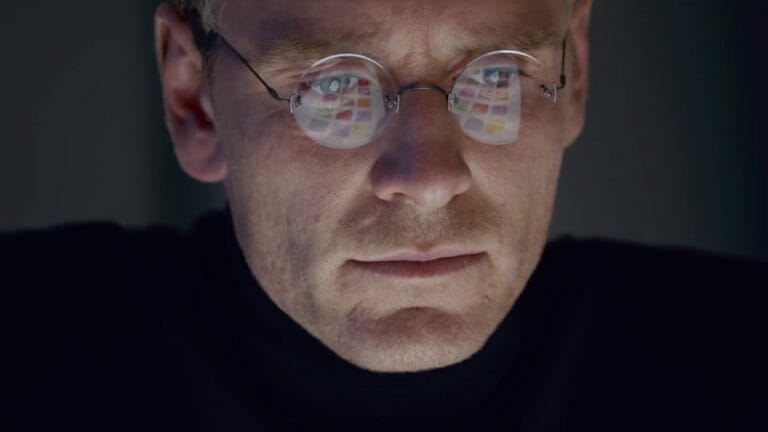By Staff · October 14, 2015

There's a thrill to being a fly on the wall that makes even the most well-versed historical events feel intimate and immediate. Writer Aaron Sorkin and director Danny Boyle make the most of this in Steve Jobs, which cleverly invokes the structure of a play in order to convey a sense of presence not unlike last year's Birdman. Sorkin’s script is broken into three distinct acts, each of which is presented as a sort of extended dialogue sequence that unfolds in quasi real-time. Like Birdman, the experience of watching the film comes strikingly close to the feeling of being right there in the thick of it, which, given Sorkin’s penchant for the snappiest of dialogue, results in one of the most intense and uniquely thrilling biographical pictures in recent memory.
The film unfolds episodically, with each act taking place moments before three landmark launches in Jobs’ legacy: the Macintosh in ‘84, the NeXT in ‘88, and finally the iMac in 98’. Michael Fassbender disappears into the leading role, instilling Jobs with an intoxicating presence that’s usually reserved for movies starring Daniel Day Lewis. The supporting roles are more subdued, but equally well cast; Kate Winslet gives one of her best performances as Jobs’ marketing advisor Joanna Hoffman, and Seth Rogen makes for a pitch perfect Steve Wozniak. The film itself unfolds in perpetual motion, and much of the well-versed backstory is referenced only through the occasional flashback.
For the majority of its surprisingly tight running time, Steve Jobs is in the moment, and the aforementioned sense of presence is unmatched. If you’re familiar at all with Jobs and his time at Apple, it’s possible that you won’t learn anything new here. Then again, you’ll be surprised by the insights a more intimate perspective has to offer. Claims that the film amounts to little more than a cinematic smear campaign prove insubstantiated. By nearly all accounts, the real-life Jobs was riddled with imperfections, but isn't everybody?
It’s easy to mythologize a guy like Steve Jobs — the man on the mountain, so to speak. Well aware of this, Aaron Sorkin takes it upon himself to drag the myth back down to our level. Jobs grows as a character throughout the film, but the most striking change is one of audience perception. We meet Jobs as a fully formed figure – a young, aggressive CEO on the brink of greatness – but by the end of the film, his accomplishments feel almost incidental in comparison to his developing relationship with his daughter, whose paternitity he initially casts into doubt.
That’s a tricky balancing act, and the structure of Sorkin’s script isn’t always the most conducive to saccharine emotional payoffs. Fortunately, director Danny Boyle has plenty of experience marrying kinetic visuals and lightning-fast pacing with a strong emotional catharsis, and Steve Jobs hums with the same sensibility that defined movies like Trainspotting and 127 Hours. He manages to hit most, if not all, of the right notes, which saves the finale from feeling detached from the movie that came before it.
I first encountered Jobs over a decade ago in the form of a made-for-tv movie called The Pirates of Silicon Valley. He was an enigmatic figure then, and his mystique has only continued to grow in the years since – particularly, perhaps, in the intervening years since his passing. Apple’s products are more than just familiar; they’re fused with our personal identity and entrenched in our day-to-day. Even now I’m sitting here typing away on my MacBook Pro, pausing only occasionally to check my iPhone. I am always connected and never alone, and chances are that’s true for you too. Steve Jobs may not be the founding father of mass communication, but his legacy serves as its current caretaker. It’s not surprising then that there remains an incessant fascination with his life.
Feeding the fire is the fact that, aside from his incredible keynotes, his role has always been a bit murky. At one point in the new film, Steve Wozniak point-blank asks Jobs, “What do you do?” Jobs responds, “Musicians play their instruments, I play the orchestra.” It's a profound notion until Wozniak points out that it’s kind of meaningless in practical terms. Likewise, following Jobs' death in 2011, Walter Isaacson’s in-depth biography provided fodder to long-standing rumors that the real Jobs was something of a departure from the endearing figure that defined his cult of personality. Sorkin’s script is cut from that same cloth. His version of Jobs is no tyrant, but he is a person, and people can be jerks. As per that whole "fly on the wall" thing, it's a mezmerizing thing to witness a giant like Jobs exhibiting such recognizably human flaws. It's like watching God bleed, and that's always been enough to draw a crowd.
Some have dismissed the film as opportunistic. In one respect, I suppose it is. If we didn't collectively possess a curiosity worth the price of an admission ticket, it's unlikely the film would've ever been made. Whether or not that's enough to condemn something that does little, if anything, to legitimately tarnish Jobs' reputation likely depends on your perspective. Either way, there's no denying the power of what Sorkin, Boyle, and Fassbender have accomplished here.
Unsurprisingly, Steve Jobs works well as a companion piece to The Social Network (also written by Sorkin) — each film presents its audience with a modern-day, real-world Citizen Kane, and then proceeds to deconstruct the myth in thrilling fashion. It can be easy to forget that enduring legacies have a habit of transcending personal flaws; just ask the kid that sees “dad” first, before "Time Magazine’s Man of the Year”. At one point in the film, Jobs suggests to a colleague that the nature of people is something to be overcome. Thankfully, this is perhaps the one feat at which he fails.